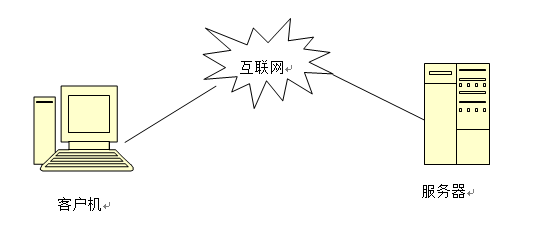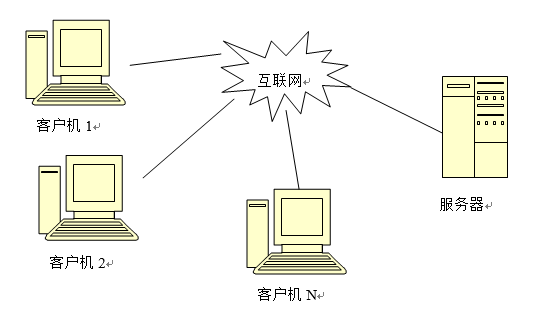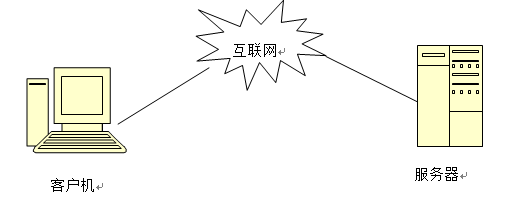Linux下echo与time服务的程序实现
1.网络拓扑结构:

2.源码:
#include
#include
#include
#include
#include
#include
#include
#include
#include
#include
#include
#define LINELEN 128
extern int errno;
int TCPecho(const char *host, const char *service);
int errexit(const char *format,…);
int connectsock(const char *host, const char *service, const char *transport );
int connectTCP(const char *host, const char *service);
int main(int argc, char *argv[]){
char *host= “localhost”;
char *service= “echo”;
switch(argc){
case 1:
host = “localhost”;
break;
case 3:
service = argv[2];
case 2:
host=argv[1];
break;
default:
fprintf(stderr,”usage:TCPecho[host[port]]n”);
exit(1);
}
TCPecho(host,service);
exit(0);
}
int TCPecho(const char *host,const char *service){
char buf[LINELEN+1];
int s,n;
int outchars, inchars;
s=connectTCP(host, service);
while(fgets(buf,sizeof(buf),stdin)){
buf[LINELEN]=’�’;
outchars=strlen(buf);
(void)write(s,buf,outchars);
for(inchars=0;inchars
if(n<0)
errexit(“socker read failed: %sn”,strerror(errno));
}
fputs(buf,stdout);
}
}
int errexit(const char *format,…){
va_list arg;
va_start(arg, format);
vfprintf(stderr,format,arg);
va_end(arg);
exit(1);
}
int connectsock(const char *host, const char *service, const char *transport )
/*
* Arguments:
* host – name of host to which connection is desired
* service – service associated with the desired port
* transport – name of transport protocol to use (“tcp” or “udp”)
*/
{
struct hostent *phe; /* pointer to host information entry */
struct servent *pse; /* pointer to service information entry */
struct protoent *ppe; /* pointer to protocol information entry*/
struct sockaddr_in sin; /* an Internet endpoint address */
int s, type; /* socket descriptor and socket type */
memset(&sin, 0, sizeof(sin));
sin.sin_family = AF_INET;
/* Map service name to port number */
if ( pse = getservbyname(service, transport) )
sin.sin_port = pse->s_port;
else if ((sin.sin_port=htons((unsigned short)atoi(service))) == 0)
errexit(“can’t get “%s” service entryn”, service);
/* Map host name to IP address, allowing for dotted decimal */
if ( phe = gethostbyname(host) )
memcpy(&sin.sin_addr, phe->h_addr, phe->h_length);
else if ( (sin.sin_addr.s_addr = inet_addr(host)) == INADDR_NONE )
errexit(“can’t get “%s” host entryn”, host);
/* Map transport protocol name to protocol number */
if ( (ppe = getprotobyname(transport)) == 0)
errexit(“can’t get “%s” protocol entryn”, transport);
/* Use protocol to choose a socket type */
if (strcmp(transport, “udp”) == 0)
type = SOCK_DGRAM;
else
type = SOCK_STREAM;
/* Allocate a socket */
s = socket(PF_INET, type, ppe->p_proto);
if (s < 0)
errexit(“can’t create socket: %sn”, strerror(errno));
/* Connect the socket */
if (connect(s, (struct sockaddr *)&sin, sizeof(sin)) < 0)
errexit(“can’t connect to %s.%s: %sn”, host, service,
strerror(errno));
return s;
}
int connectTCP(const char *host, const char *service){
return connectsock(host,service,”tcp”);
}
二、针对echo服务的并发的面向连接的服务器软件的实现
1.网络拓扑结构:

2.源码:
#define _USE_BSD
#include
#include
#include
#include
#include
#include
#include
#include
#include
#include
#include
#include
#define QLEN 32
#define BUFSIZE 4096
extern int errno;
unsigned short portbase = 0;
void reaper(int);
int TCPechod(int fd);
int errexit(const char *format,…);
int passivesock(const char *service, const char *transport, int qlen);
int passiveTCP(const char *service,int qlen);
int main(int argc, char *argv[]){
char *service= “echo”;
struct sockaddr_in fsin;
unsigned int alen;
int msock,ssock;
switch(argc){
case 1:
break;
case 2:
service=argv[1];
break;
default:
errexit(“usage: TCPechod [port]n”);
}
msock=passiveTCP(service,QLEN);
(void)signal(SIGCHLD,(__sighandler_t)QLEN);
while(1){
alen=sizeof(fsin);
ssock=accept(msock,(struct sockaddr *)&fsin,&alen);
if(ssock<0){
if(errno==EINTR) continue;
errexit(“accept: %sn”,strerror(errno));
}
switch(fork()){
case 0:
(void)close(msock);
exit(TCPechod(ssock));
default:
(void)close(ssock);
break;
case -1:
errexit(“fork: %sn”,strerror(errno));
}
}
}
void reaper(int sig){
int status;
while(wait3(&status,WNOHANG,(struct rusage *)0)>=0) ;
}
int TCPechod(int fd){
char buf[BUFSIZ];
int cc;
while(cc=read(fd,buf,sizeof(buf))){
if(cc<0)
errexit(“echo read: %sn”,strerror(errno));
if(write(fd,buf,cc)<0)
errexit(“echo write: %sn”,strerror(errno));
}
return 0;
}
int errexit(const char *format,…){
va_list arg;
va_start(arg, format);
vfprintf(stderr,format,arg);
va_end(arg);
exit(1);
}
int passivesock(const char *service, const char *transport, int qlen)
/*
* Arguments:
* service – service associated with the desired port
* transport – transport protocol to use (“tcp” or “udp”)
* qlen – maximum server request queue length
*/
{
struct servent*pse;/* pointer to service information entry*/
struct protoent *ppe;/* pointer to protocol information entry*/
struct sockaddr_in sin;/* an Internet endpoint address*/
int s, type;/* socket descriptor and socket type*/
memset(&sin, 0, sizeof(sin));
sin.sin_family = AF_INET;
sin.sin_addr.s_addr = INADDR_ANY;
/* Map service name to port number */
if ( pse = getservbyname(service, transport) )
sin.sin_port = htons(ntohs((unsigned short)pse->s_port)+ portbase);
else
if ((sin.sin_port=htons((unsigned short)atoi(service)+portbase)) == 0)
errexit(“can’t create passive service %d n”,sin.sin_port);
/* Map protocol name to protocol number */
if ( (ppe = getprotobyname(transport)) == 0)
errexit(“can’t get “%s” protocol entryn”, transport);
/* Use protocol to choose a socket type */
if (strcmp(transport, “udp”) == 0)
type = SOCK_DGRAM;
else
type = SOCK_STREAM;
/* Allocate a socket */
s = socket(PF_INET, type, ppe->p_proto);
if (s < 0)
errexit(“can’t create socket: %sn”, strerror(errno));
/* Bind the socket */
if (bind(s, (struct sockaddr *)&sin, sizeof(sin)) < 0)
errexit(“can’t bind to %s port: %sn”, service,
strerror(errno));
if (type == SOCK_STREAM && listen(s, qlen) < 0)
errexit(“can’t listen on %s port: %sn”, service,
strerror(errno));
return s;
}
int passiveTCP(const char *service,int qlen){
return passivesock(service,”tcp”,qlen);
}
三、针对TIME服务的UDP客户软件的实现
1.网络拓扑结构:

2.源码:
#include
#include
#include
#include
#include
#include
#include
#include
#include
#include
#include
#include
#define BUFSIZE 64
#define UNIXEPOCH 2208988800UL
#define MSG “what time is it?n”
extern int errno;
int errexit(const char *format,…);
int connectsock(const char *host, const char *service, const char *transport );
int connectUDP(const char *host, const char *service);
int main(int argc, char *argv[]){
char *host= “localhost”;
char *service= “time”;
time_t now;
int s,n;
switch(argc){
case 1:
host = “localhost”;
break;
case 3:
service = argv[2];
case 2:
host=argv[1];
break;
default:
fprintf(stderr,”usage: UDPtime[host[port]]n”);
exit(1);
}
s=connectUDP(host,service);
(void)write(s,MSG,strlen(MSG));
n=read(s,(char *)&now,sizeof(now));
if(n<0) errexit("read failed: %sn",strerror(errno));
now=ntohl((unsigned long)now);
now-=UNIXEPOCH;
printf(“%s”,ctime(&now));
exit(0);
}
int errexit(const char *format,…){
va_list arg;
va_start(arg, format);
vfprintf(stderr,format,arg);
va_end(arg);
exit(1);
}
int connectsock(const char *host, const char *service, const char *transport )
/*
* Arguments:
* host – name of host to which connection is desired
* service – service associated with the desired port
* transport – name of transport protocol to use (“tcp” or “udp”)
*/
{
struct hostent *phe; /* pointer to host information entry */
struct servent *pse; /* pointer to service information entry */
struct protoent *ppe; /* pointer to protocol information entry*/
struct sockaddr_in sin; /* an Internet endpoint address */
int s, type; /* socket descriptor and socket type */
memset(&sin, 0, sizeof(sin));
sin.sin_family = AF_INET;
/* Map service name to port number */
if ( pse = getservbyname(service, transport) )
sin.sin_port = pse->s_port;
else if ((sin.sin_port=htons((unsigned short)atoi(service))) == 0)
errexit(“can’t get “%s” service entryn”, service);
/* Map host name to IP address, allowing for dotted decimal */
if ( phe = gethostbyname(host) )
memcpy(&sin.sin_addr, phe->h_addr, phe->h_length);
else if ( (sin.sin_addr.s_addr = inet_addr(host)) == INADDR_NONE )
errexit(“can’t get “%s” host entryn”, host);
/* Map transport protocol name to protocol number */
if ( (ppe = getprotobyname(transport)) == 0)
errexit(“can’t get “%s” protocol entryn”, transport);
/* Use protocol to choose a socket type */
if (strcmp(transport, “udp”) == 0)
type = SOCK_DGRAM;
else
type = SOCK_STREAM;
/* Allocate a socket */
s = socket(PF_INET, type, ppe->p_proto);
if (s < 0)
errexit(“can’t create socket: %sn”, strerror(errno));
/* Connect the socket */
if (connect(s, (struct sockaddr *)&sin, sizeof(sin)) < 0)
errexit(“can’t connect to %s.%s: %sn”, host, service,
strerror(errno));
return s;
}
int connectUDP(const char *host, const char *service){
return connectsock(host,service,”udp”);
}
四、针对TIME服务的UDP服务器端软件的实现
1.网络拓扑结构:

2.源码:
#include
#include
#include
#include
#include
#include
#include
#include
#include
#include
#include
#define UNIXEPOCH 2208988800UL
extern int errno;
unsigned short portbase = 0;
int errexit(const char *format,…);
int passivesock(const char *service, const char *transport, int qlen);
int passiveUDP(const char *service);
int main(int argc, char *argv[]){
char *service= “time”;
struct sockaddr_in fsin;
char buf[1];
int sock;
time_t now;
unsigned int alen;
switch(argc){
case 1:
break;
case 2:
service=argv[1];
break;
default:
errexit(“usage: UDPtimed [port]n”);
}
sock=passiveUDP(service);
while(1){
alen=sizeof(fsin);
if(recvfrom(sock,buf,sizeof(buf),0,(struct sockaddr *)&fsin,&alen)<0)
errexit(“recvfrom: %sn”,strerror(errno));
(void)time(&now);
now=htonl((unsigned long)(now+UNIXEPOCH));
(void)sendto(sock,(char*)&now,sizeof(now),0,(struct sockaddr *)&fsin,sizeof(fsin));
}
}
int errexit(const char *format,…){
va_list arg;
va_start(arg, format);
vfprintf(stderr,format,arg);
va_end(arg);
exit(1);
}
int passivesock(const char *service, const char *transport, int qlen)
/*
* Arguments:
* service – service associated with the desired port
* transport – transport protocol to use (“tcp” or “udp”)
* qlen – maximum server request queue length
*/
{
struct servent*pse;/* pointer to service information entry*/
struct protoent *ppe;/* pointer to protocol information entry*/
struct sockaddr_in sin;/* an Internet endpoint address*/
int s, type;/* socket descriptor and socket type*/
memset(&sin, 0, sizeof(sin));
sin.sin_family = AF_INET;
sin.sin_addr.s_addr = INADDR_ANY;
/* Map service name to port number */
if ( pse = getservbyname(service, transport) )
sin.sin_port = htons(ntohs((unsigned short)pse->s_port)+ portbase);
else
if ((sin.sin_port=htons((unsigned short)atoi(service)+portbase)) == 0)
errexit(“can’t create passive service %d n”,sin.sin_port);
/* Map protocol name to protocol number */
if ( (ppe = getprotobyname(transport)) == 0)
errexit(“can’t get “%s” protocol entryn”, transport);
/* Use protocol to choose a socket type */
if (strcmp(transport, “udp”) == 0)
type = SOCK_DGRAM;
else
type = SOCK_STREAM;
/* Allocate a socket */
s = socket(PF_INET, type, ppe->p_proto);
if (s < 0)
errexit(“can’t create socket: %sn”, strerror(errno));
/* Bind the socket */
if (bind(s, (struct sockaddr *)&sin, sizeof(sin)) < 0)
errexit(“can’t bind to %s port: %sn”, service,
strerror(errno));
if (type == SOCK_STREAM && listen(s, qlen) < 0)
errexit(“can’t listen on %s port: %sn”, service,
strerror(errno));
return s;
}
int passiveUDP(const char *service){
return passivesock(service,”udp”,0);
}
这里是用的我实验时的代码,前两个是关于echo服务的客户端与服务器端,有下面运行截图:

后两个是关于time服务的,有下面运行截图:

实验时由于多次运行验证,总会出现端口占用的情况,于是这里每次运行时都输入程序的入口参数(就是main函数里的形参),自选端口,方便至极。还有就是代码里多个函数可以写入多个cpp里,这里偷懒了。